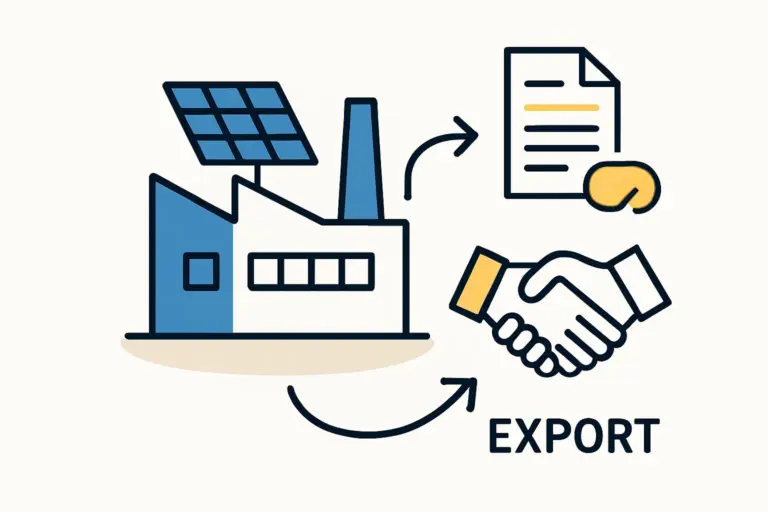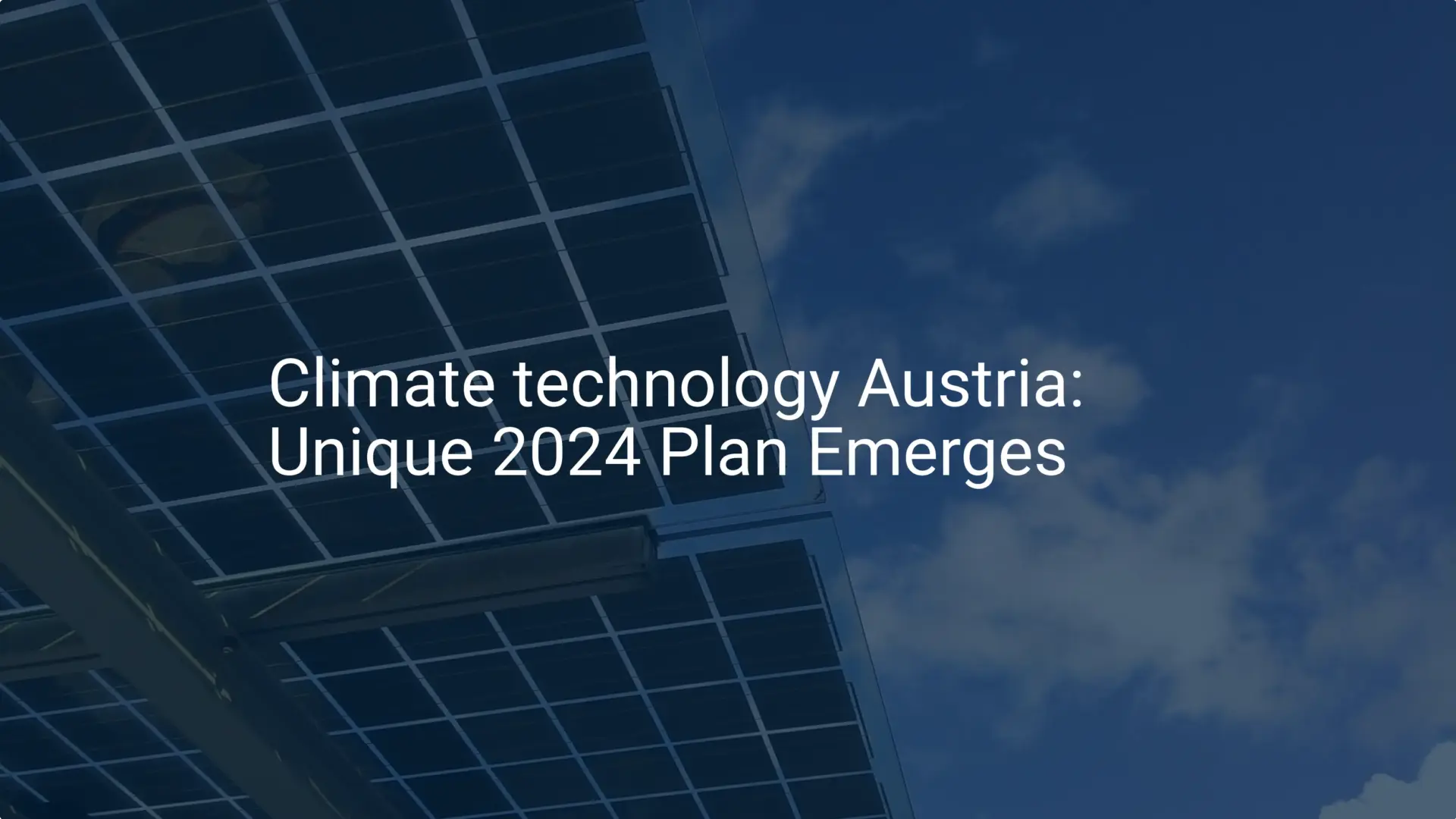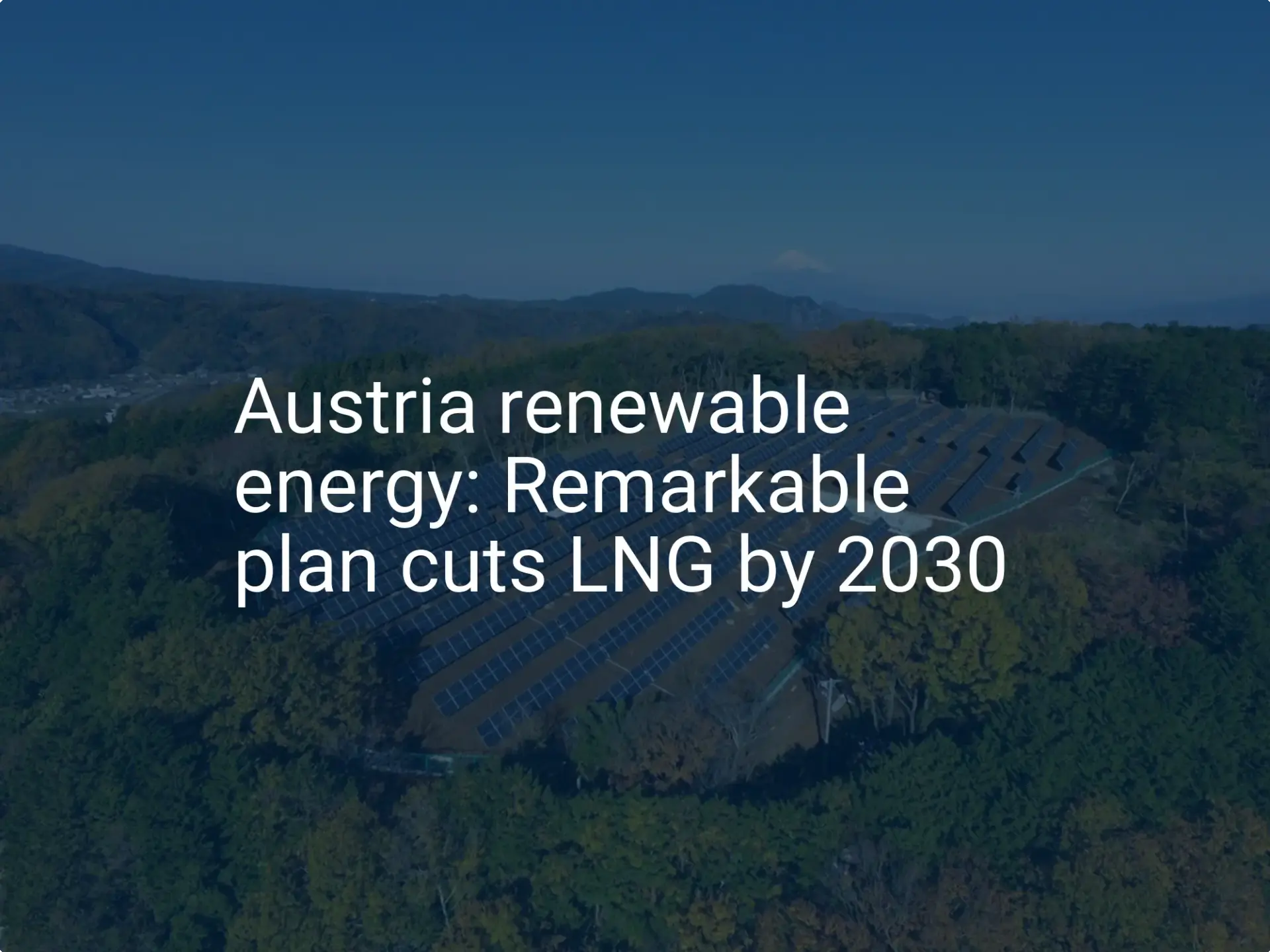A Comprehensive Guide to Austrian Solar Manufacturing Regulations for 2025 and Beyond
Austria’s ambitious renewable energy targets present a significant opportunity for solar manufacturers. As the nation strives for 100% renewable electricity by 2030 and climate neutrality by 2040, the demand for locally produced solar modules is set to grow. This guide offers a roadmap for navigating the regulatory landscape to successfully establish and operate a solar module production facility in Austria.
Table of Contents
Understanding Austria’s Energy Goals and Legal Foundations
Successfully entering the Austrian solar manufacturing sector requires a firm grasp of the country’s energy policy and legal framework. Austria’s strategy is underpinned by its national climate goals and key federal legislation, shaping both challenges and opportunities in the local energy and environment landscape.
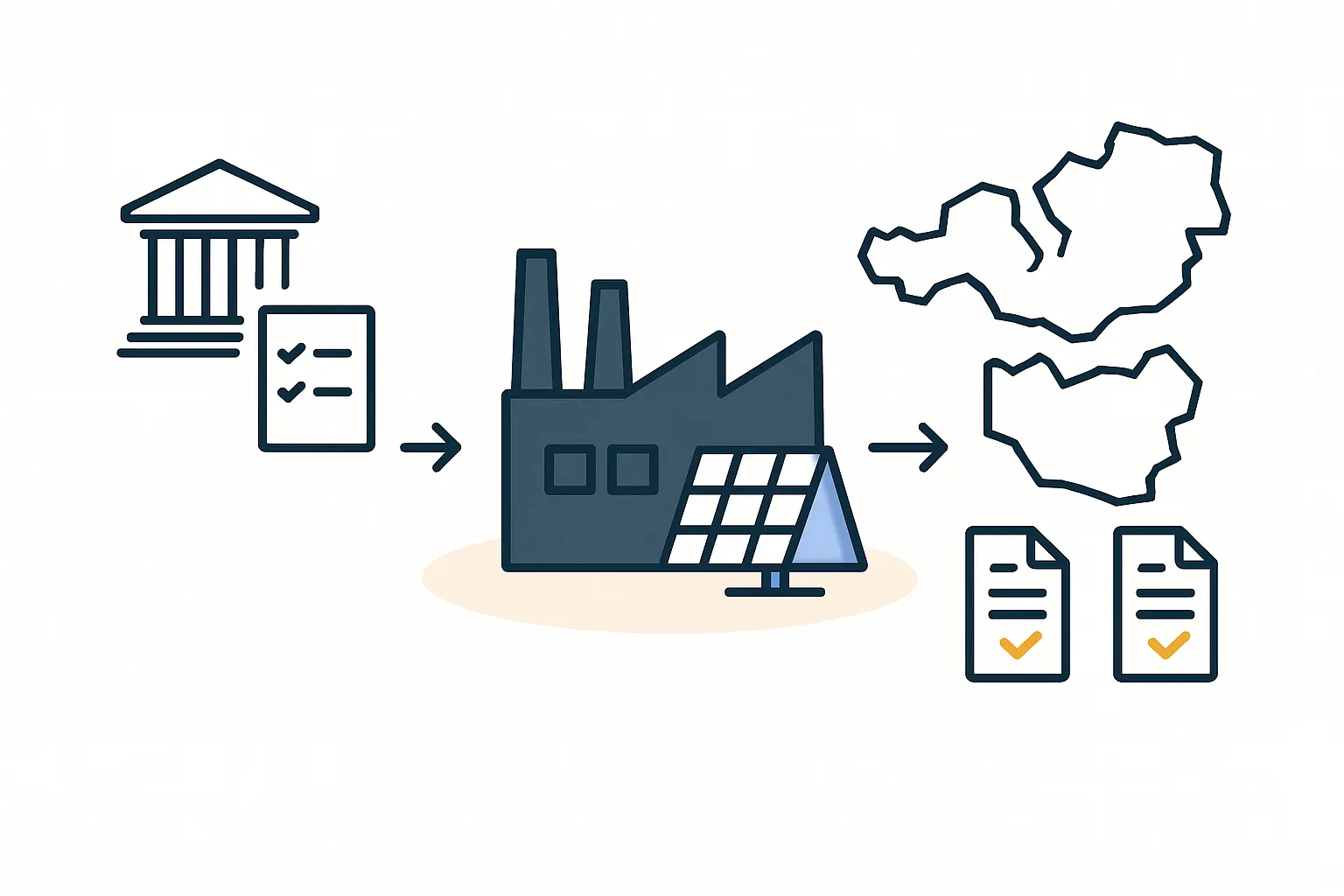
At the core of this framework is the Renewable Energy Expansion Act (Erneuerbaren-Ausbau-Gesetz, EAG). This pivotal legislation aims to significantly increase renewable electricity generation, with a substantial portion dedicated to photovoltaics. The EAG outlines provisions for investment subsidies and market premiums, which are crucial for manufacturers.
Updates effective from January 1, 2025, will allow photovoltaic projects over 1 MW to receive subsidies even with a Power Purchase Agreement (PPA) in place. Investment subsidies for electrical storage linked to these projects have also been increased.
Other key federal laws include:
- Austrian Electricity Act (Elektrizitätswirtschafts- und -organisationsgesetz, ElWOG), which governs the overall electricity market.
- Environmental Impact Assessment Act (Umweltverträglichkeitsprüfungsgesetz, UVP-G), which is particularly relevant for larger manufacturing plants, as it mandates environmental assessments for projects that exceed certain thresholds.
Understanding the division of responsibilities is also critical. Regulatory authority in Austria is shared between the federal government and the nine provincial (Bundesländer) governments. While federal laws provide the overarching structure, provincial regulations cover aspects such as building codes, nature protection, and spatial planning. European Union (EU) Directives, like the Renewable Energy Directive and the Waste Electrical and Electronic Equipment (WEEE) Directive, are transposed into Austrian law and directly shape manufacturing standards and obligations.
Don’t just dream solar, do solar.
From practical implementation via our services to strategic mastery with our Premium Course, we empower your vision every step of the way. Unlock your full potential in the clean energy revolution.
Key Permits and Licenses for Your Austrian Solar Factory
Establishing a solar manufacturing facility in Austria involves navigating a series of permitting and licensing procedures. While there is no single “one-stop-shop” permit that covers all aspects, a structured approach will streamline the process.
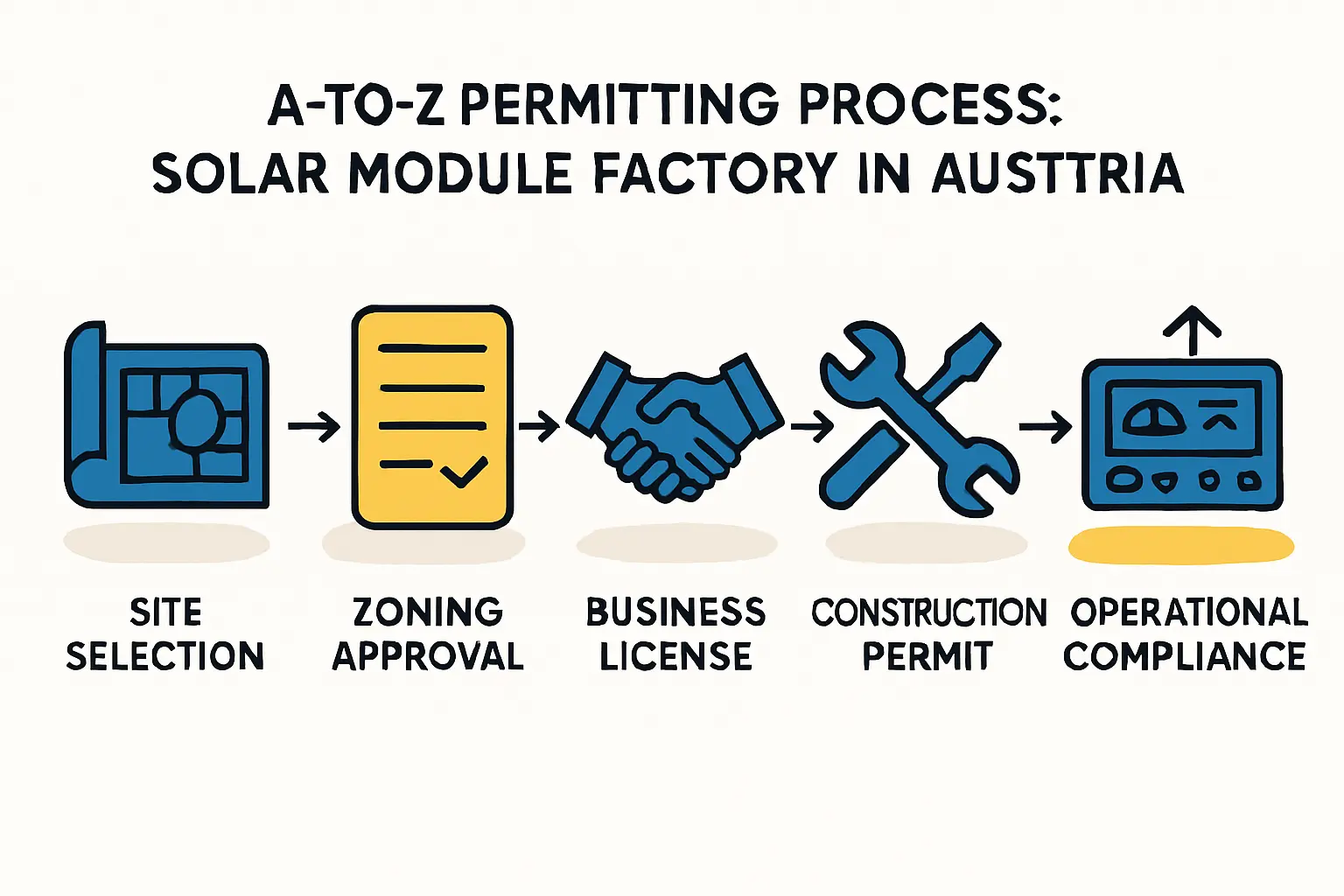
1. Zoning and Location Approval:
- Before any construction, your chosen site must be zoned for industrial use. This step requires compliance with provincial spatial planning laws (Raumordnungsgesetze).
2. Business and Trade Licenses:
- Operating a manufacturing business requires a trade license (Gewerbeberechtigung) under the Austrian Trade Act (Gewerbeordnung). The application is typically made to the local district administrative authority (Bezirkshauptmannschaft).
3. Construction Permits:
- Once the location is confirmed and the business license is underway, you will need a construction permit (Baugenehmigung). This permit is governed by the specific building codes (Bauordnungen) of the province where your facility will be located.
4. Operational Permits:
- Depending on the size and nature of your plant, specific operational permits covering emissions, waste handling, and machinery might be necessary.
5. Specialized Permits:
- If your facility impacts water resources—for example, for cooling or wastewater discharge—a permit under the Water Rights Act (Wasserrechtsgesetz) will be required.
The District Administrative Authorities are often the primary point of contact for many of these permits. For very large facilities, the Environmental Impact Assessment Act (UVP-G) can trigger a consolidated permitting process managed by the provincial government or the Federal Ministry for Climate Action, Environment, Energy, Mobility, Innovation and Technology (BMK), which then acts as a “one-stop-shop.”
Timelines for these processes vary depending on project complexity and the specific province. Engaging with authorities early and preparing thorough documentation is essential to avoid delays.
Meeting Austria’s Environmental Standards in Solar Production
Austria upholds stringent environmental regulations, which solar manufacturers must incorporate into their operations from the outset. A commitment to green production is not just a matter of compliance but also aligns with the ethos of renewable energy.
Environmental Impact Assessments (EIAs):
- For larger manufacturing plants, an EIA under the UVP-G is mandatory. This comprehensive assessment evaluates the potential environmental effects of the project and outlines necessary mitigation measures.
Air and Water Emission Standards:
- Your facility must comply with Austrian limits for air emissions, such as from solvents or heating systems, and water discharge, such as process wastewater. This may require installing specific abatement technologies.
Waste Management:
A robust waste management plan is crucial and should cover the following:
- Industrial Waste: Proper handling and disposal of byproducts from the module manufacturing process.
- Hazardous Materials and Chemicals: Safe storage, use, and disposal of any hazardous substances involved in production, in line with chemical safety laws.
- End-of-Life Panel Considerations: Although manufacturers primarily focus on new products, they must also be aware of their producer responsibilities under the WEEE directive. This involves contributing to systems for collecting and recycling solar panels at the end of their lifespan.
Nature Protection Laws:
- Provincial nature protection laws (Naturschutzgesetze) must also be followed, particularly concerning the facility’s impact on local biodiversity and ecosystems during site selection and construction.
Product Quality, Safety, and Grid Integration Requirements
The quality and safety of your solar modules and production facility are paramount. Compliance is guided by a framework of Austrian and EU standards.
Product Standards for Solar Modules:
Solar modules sold in Austria and the wider EU market must meet specific standards.
- CE Marking: This marking signifies conformity with the health, safety, and environmental protection standards for products sold within the European Economic Area (EEA).
- ÖVE/ÖNORM Standards: These are Austrian national standards, often harmonized with European (EN) and international (IEC) standards, covering the electrical safety and performance of photovoltaic modules.
Manufacturing Process Quality Control:
- Implementing robust quality control systems in your factory is vital to consistently meet these product standards. This should include raw material inspection, in-process checks, and final product testing.
Occupational Health and Safety Regulations:
- Austrian employment law contains comprehensive occupational health and safety standards (Arbeitsschutzgesetz) to protect workers. This includes conducting risk assessments, providing safety training, ensuring the use of appropriate personal protective equipment, and ensuring safe machinery operation.
Grid Connection for Testing Facilities or On-Site Generation:
- If your manufacturing plant includes facilities for testing modules or has its own on-site solar generation system connected to the public grid, you must comply with regulations set by the Austrian energy regulator, E-Control, and the technical requirements of local grid operators. The ElWOG mandates a general connection obligation for grid operators, with regulated fees.
Accessing Financial Support for Your Solar Manufacturing Venture
Austria offers various financial incentives and support mechanisms that can benefit solar manufacturers, particularly those contributing to local value chains and European production goals.
Investment Subsidies under the EAG:
- The Renewable Energy Expansion Act (EAG) provides investment subsidies for renewable energy projects, which may also cover manufacturing capabilities under certain conditions. The 2025 updates to the EAG enhance these opportunities.
The “Made in Europe” Bonus:
- A significant development is the “Made in Europe” bonus. Effective from June 23, 2025, this initiative offers a 20% bonus on government funding for photovoltaic and energy storage projects that use European components. Manufacturers should investigate the eligibility criteria to best position their products for this bonus, making them more competitive for developers seeking these subsidies.
Other Federal and Provincial Funding Opportunities:
- Beyond the EAG, various federal and provincial programs may offer grants, low-interest loans, or guarantees for industrial investments, particularly those focused on innovation, job creation, or green technologies.
Tax Considerations and Potential Incentives:
- Consulting with financial advisors about Austria’s corporate tax system and potential tax incentives for R&D or environmentally friendly investments is also a recommended step.
Support for R&D in Solar Technology:
- Austria encourages research and development. Funding programs often support innovation in solar technology and can be a valuable resource for manufacturers developing next-generation products or processes.
Considerations for Foreign Investors and Market Overview
Austria is generally welcoming to foreign investment, but certain aspects require careful consideration, especially for strategic sectors like energy. Following local business regulation news is key for a smooth entry.
Austrian Foreign Direct Investment (FDI) Screening:
- Investments by non-EU/EEA entities in critical infrastructure, including energy production, may be subject to an FDI screening process under the Investment Control Act (Investitionskontrollgesetz). This process ensures that foreign investments do not pose a threat to national security or public order. Foreign investors need to understand the relevant thresholds and notification requirements.
Key Market Players and Regulators:
- The primary market regulator is E-Control, which oversees the electricity and gas markets to ensure fair competition and transparent grid access. Familiarity with grid operators and major energy utilities is also highly beneficial.
The Future of Solar Manufacturing in Austria: Trends and Policies
The Austrian solar manufacturing landscape is dynamic, shaped by ongoing policy developments and the nation’s steadfast commitment to its climate goals.
- The proposed Renewable Energy Expansion Acceleration Act (Erneuerbaren-Ausbau-Beschleunigungs-Gesetz, EABG) aims to further streamline permitting for renewable energy projects, which could indirectly benefit manufacturing by fostering a more robust domestic market.
- Staying informed about these legislative changes is crucial for effective strategic planning.
Austria’s path to achieving 100% renewable electricity by 2030 and climate neutrality by 2040 relies heavily on a significant expansion of solar power. This creates sustained demand and a favorable environment for domestic solar module manufacturing.
The emphasis on European supply chain resilience, along with initiatives like the “Made in Europe” bonus, further underscore the strategic importance of local production.
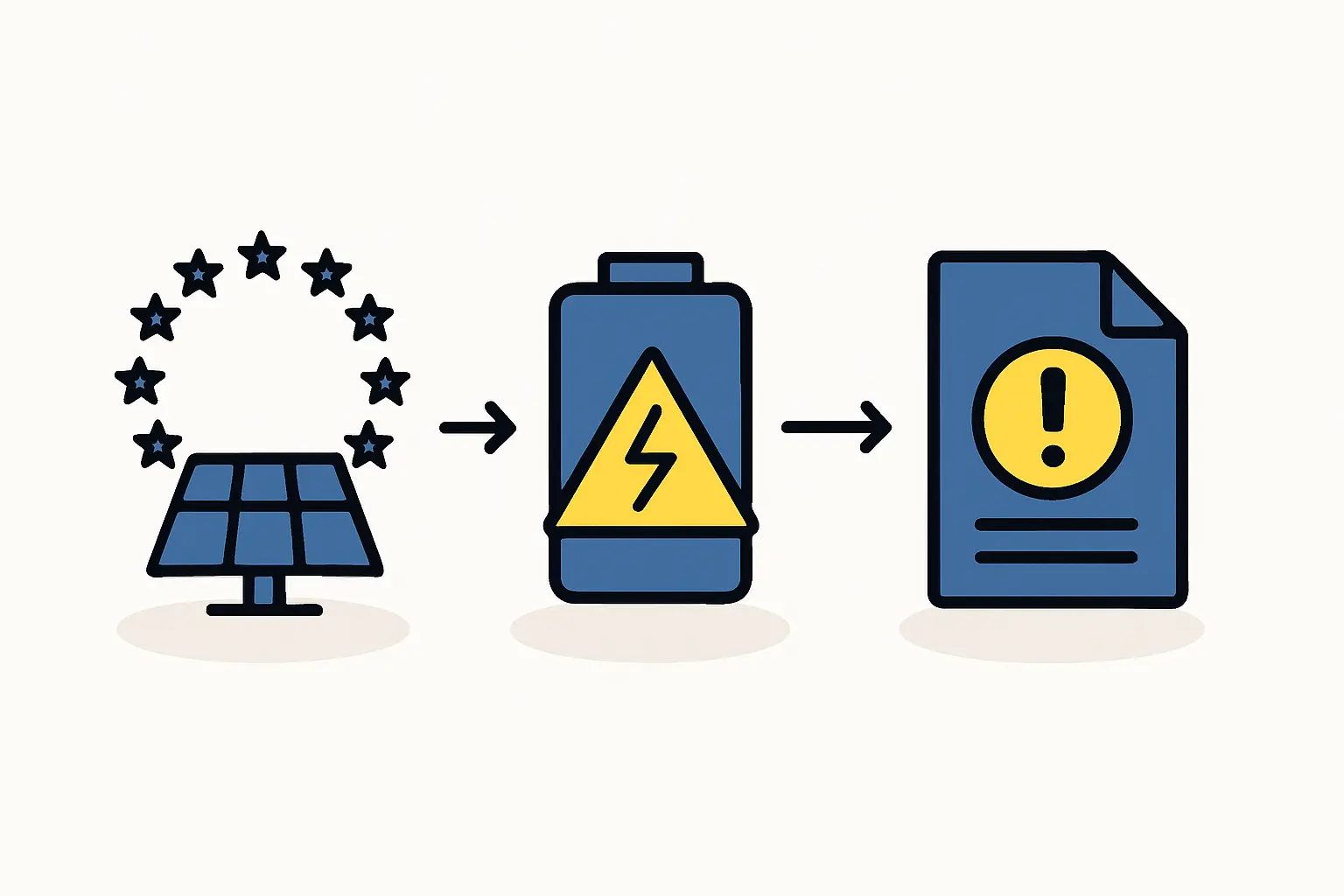
Your Next Steps in Austrian Solar Manufacturing
Successfully navigating the regulatory framework for solar manufacturing in Austria requires careful planning and due diligence. The legal, environmental, and technical requirements are comprehensive, reflecting the country’s commitment to quality and sustainability.
However, with its strong policy support, clear climate targets, and initiatives promoting local production, Austria offers a promising environment for solar manufacturers. The most effective strategy for a smooth market entry is to engage with local legal and technical experts early in the planning process. By understanding the regulations and leveraging the available support, you can establish a successful solar module production facility and contribute to Austria’s clean energy future.
Frequently Asked Questions (FAQs)
What are the main laws governing solar manufacturing in Austria?
The primary laws include the Renewable Energy Expansion Act (EAG) for subsidies and targets, the Austrian Electricity Act (ElWOG) for market regulation, the Environmental Impact Assessment Act (UVP-G) for large projects, the Trade Act (Gewerbeordnung) for business licenses, and various provincial building, spatial planning, and nature protection laws. EU directives also play a significant role.
How long does the permitting process typically take for a solar manufacturing facility?
The timeline can vary significantly based on the project’s complexity, location, and whether a full Environmental Impact Assessment (EIA) is required. It can range from several months for simpler setups to over a year for large facilities requiring multiple permits or an EIA. Early consultation with authorities is vital.
Are there specific environmental standards for solar panel factories in Austria?
Yes, solar panel factories must adhere to general industrial environmental standards for air and water emissions, waste management, and chemical handling. If the factory exceeds certain size or production thresholds, a formal Environmental Impact Assessment (EIA) under the UVP-G may be required.
What is the “Made in Europe” bonus and how can manufacturers benefit?
The “Made in Europe” bonus, effective June 23, 2025, provides a 20% bonus on government funding for solar PV and storage projects using significant European components. Austrian manufacturers can benefit if their modules qualify, making them more attractive to developers seeking this bonus.
Do I need a local partner to set up a solar manufacturing facility in Austria?
While not legally mandatory, having local partners or consultants with expertise in Austrian law and permitting is highly advantageous. They can help navigate the complex regulatory environment, liaise with authorities, and expedite processes.


